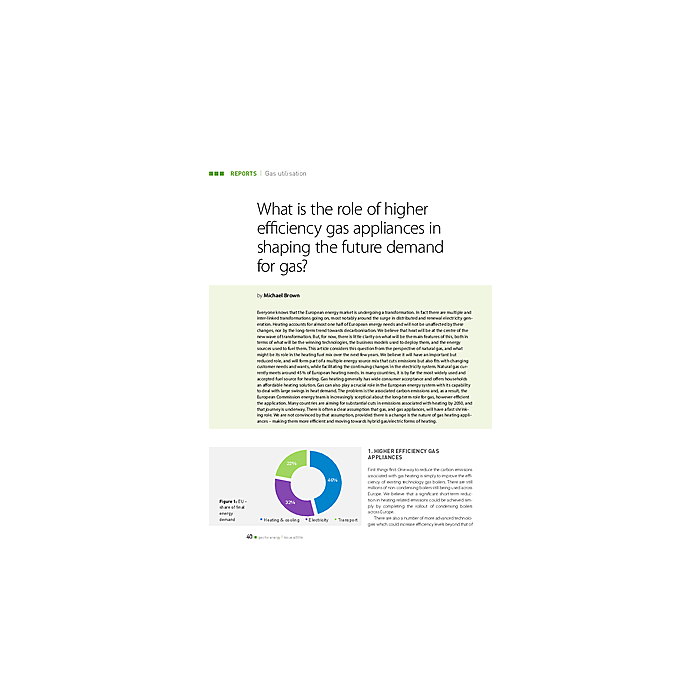What is the role of higher efficiency gas appliances in shaping the future demand for gas?
4,90 €
Auf Lager
Artikelnummer
00258_2016_04_03
Everyone knows that the European energy market is undergoing a transformation. In fact there are multiple and inter-linked transformations going on, most notably around the surge in distributed and renewal electricity generation. Heating accounts for almost one half of European energy needs and will not be unaffected by these changes, nor by the long-term trend towards decarbonisation. We believe that heat will be at the centre of the new wave of transformation. But, for now, there is little clarity on what will be the main features of this, both in terms of what will be the winning technologies, the business models used to deploy them, and the energy sources used to fuel them. This article considers this question from the perspective of natural gas, and what might be its role in the heating fuel mix over the next few years. We believe it will have an important but reduced role, and will form part of a multiple energy source mix that cuts emissions but also fits with changing customer needs and wants, while facilitating the continuing changes in the electricity system. Natural gas currently meets around 45 % of European heating needs. In many countries, it is by far the most widely used and accepted fuel source for heating. Gas heating generally has wide consumer acceptance and offers households an affordable heating solution. Gas can also play a crucial role in the European energy system with its capability to deal with large swings in heat demand. The problem is the associated carbon emissions and, as a result, the European Commission energy team is increasingly sceptical about the long-term role for gas, however efficient the application. Many countries are aiming for substantial cuts in emissions associated with heating by 2050, and that journey is underway. There is often a clear assumption that gas, and gas appliances, will have a fast shrinking role. We are not convinced by that assumption, provided there is a change is the nature of gas heating appliances – making them more efficient and moving towards hybrid gas/electric forms of heating.
| Autoren | Michael Brown |
|---|---|
| Erscheinungsdatum | 01.04.2016 |
| Format | |
| Zeitschrift | gas for energy - Ausgabe 04 2016 |
| Verlag | DIV Deutscher Industrieverlag GmbH |
| Sprache | English |
| Titel | What is the role of higher efficiency gas appliances in shaping the future demand for gas? |
| Beschreibung | Everyone knows that the European energy market is undergoing a transformation. In fact there are multiple and inter-linked transformations going on, most notably around the surge in distributed and renewal electricity generation. Heating accounts for almost one half of European energy needs and will not be unaffected by these changes, nor by the long-term trend towards decarbonisation. We believe that heat will be at the centre of the new wave of transformation. But, for now, there is little clarity on what will be the main features of this, both in terms of what will be the winning technologies, the business models used to deploy them, and the energy sources used to fuel them. This article considers this question from the perspective of natural gas, and what might be its role in the heating fuel mix over the next few years. We believe it will have an important but reduced role, and will form part of a multiple energy source mix that cuts emissions but also fits with changing customer needs and wants, while facilitating the continuing changes in the electricity system. Natural gas currently meets around 45 % of European heating needs. In many countries, it is by far the most widely used and accepted fuel source for heating. Gas heating generally has wide consumer acceptance and offers households an affordable heating solution. Gas can also play a crucial role in the European energy system with its capability to deal with large swings in heat demand. The problem is the associated carbon emissions and, as a result, the European Commission energy team is increasingly sceptical about the long-term role for gas, however efficient the application. Many countries are aiming for substantial cuts in emissions associated with heating by 2050, and that journey is underway. There is often a clear assumption that gas, and gas appliances, will have a fast shrinking role. We are not convinced by that assumption, provided there is a change is the nature of gas heating appliances – making them more efficient and moving towards hybrid gas/electric forms of heating. |
Eigene Bewertung schreiben


